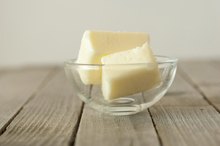Do Milk, Cheese & Yogurt Have Carbohydrates?
Dairy foods like milk, cheese, and yogurt are typically recognized nutritionally for containing calcium and protein. While these dairy-based items tend to be higher in protein and fat, they do have some carbohydrates. Naturally occurring carbs should still be considered a part of dairy's nutrition profile.
Lactose, Natural Milk Sugar
Dairy foods contain a balance of protein, fat, and carbohydrates. The proportions depend primarily on the amount of milk fat and protein included. The carbs in dairy foods come from a naturally occurring sugar that is unique to milk, called lactose. Some amount of lactose is in the majority of dairy foods except for those that purely isolate the fat, like butter, or the protein, like whey powder.
Lactose is a type of sugar, meaning it is a monosaccharide that is quickly broken down. Lactose gives the sweet flavor to plain milk and yogurt. It contributes 4 calories per gram. Because it is a sugar, it is important that diabetics and dieters monitor the amount they consume.
Carbohydrates in Milk
What Food Group Has the Least Amount of Carbohydrates?
Learn More
Milk has a pretty consistent amount of lactose in it, making the carbohydrate values similar across different types. One cup of whole milk has about 12 g of carbohydrates. One cup of low-fat milk, which has 1 percent milk fat, has about 13 g of carbohydrates. One cup of nonfat milk, which has no fat included and is also called "fat free," has about 13 g of carbohydrates, too. Look out for added sugars in flavored milk, such as chocolate or strawberry, which will significantly increase the carbohydrate values.
Carbohydrates in Cheese
Since cheese is high in protein and fat, it tends to be very low in carbohydrates. One ounce of cheddar cheese has less than half a gram of carbs, which will show up as a zero on the Nutrition Facts panel. There are a few more carbohydrates in mozzarella cheese, since it is a little lower in fat. It has about 1 g per ounce. American cheese, which is actually considered a "processed cheese food" rather than a true cheese, also has about a half a gram of carbohydrates per ounce.
Carbohydrates in Yogurt
Calories in Paneer Cheese
Learn More
Yogurt tends to have a wider range of carbohydrates because of the many different types. Yogurt can be made from whole, low-fat, or nonfat milk. There are also high-protein Greek styles. Yogurt can also be sweetened with sugar, high fructose corn syrup, or sugar-free artificial sweeteners. Check the Nutrition Facts on the label to see exactly how many carbohydrates are on the brand and type of yogurt purchased.
Plain yogurt from whole milk will have about 11 g of carbohydrates per cup. A low-fat fruit-flavored yogurt will have about 47 g of carbohydrates per cup. And a flavored sugar-free nonfat yogurt will have about 18 g of carbohydrates per cup.
Related Articles
References
- Bowes & Church's Food Values of Portions Commonly Used; Jean A. T., Ph.D. Pennington, Anna De Planter Bowes, Helen Nichols Church; 1998
- American Dietetics Association's Complete Food & Nutrition Guide, Roberta Larson Duyff, 2006
Writer Bio
A nutrition expert, Nicole Turner-Ravana has been writing for public health and food industry groups since 2000. She has a Bachelor of Science in nutrition from Pepperdine and a Master of Science in nutrition communications from Tufts. Turner-Ravana specializes in turning scientific details into user-friendly and engaging prose.









